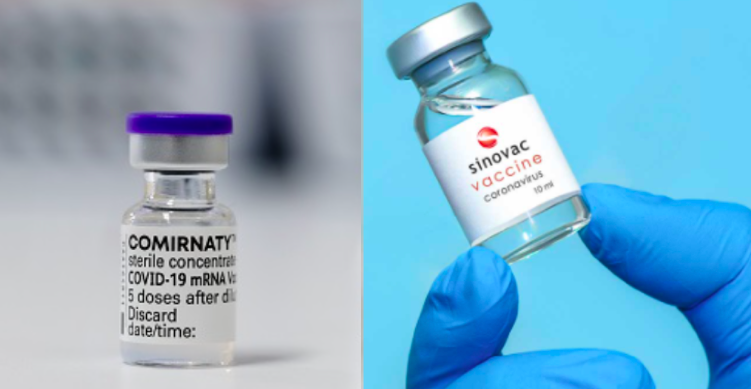A new study has shown that Covid-19 vaccines that used an inactivated virus, such as Sinovac and Sinopharm, have lower relative effectiveness than mRNA vaccines (Pfizer-BioNTech and Moderna) in preventing severe Covid symptoms.
The study, published on Tuesday (Apr 12) was carried out by a team that includes infectious diseases experts from the National Centre for Infectious Diseases (NCID) and the Ministry of Health (MOH).
It involved around 2.7 million people in Singapore from the ages of 20 and up who were vaccinated under the national programme and was held between Oct 1 to Nov 21, 2021, at the height of a surge of Covid-19 infections in Singapore from the Delta variant.
In comparison to those who received the Pfizer-BioNTech doses, people who received two Sinovac jabs were not only 2.37 times more likely to come down with a Covid-19 infection, but were also 4.59 times more likely to have a severe form of the disease—rather, to need to be admitted in a hospital’s intensive care unit (ICU) or oxygen supplementation, or death.
Furthermore, the study also suggests that between the Pfizer/BioNTech and Moderna vaccines, it is Moderna’s version that is more preventing severe disease.
This is likely due to Moderna having a higher mRNA content than the Pfizer/BioNTech vaccine, as well as the longer period between the administration of the doses, the study added, citing a report from the US Centers for Disease Control and Prevention.
Moderna’s Covid-19 vaccine doses were typically given between four and eight weeks apart, while the Pfizer/BioNTech vaccine was commonly administered between three and six weeks apart.
Individuals who received the Moderna vaccine were discovered to not only be less likely to be infected but also less than half (0.42) times as likely to develop severe symptoms than Pfizer-BioNTech recipients.
The study said, “Individuals vaccinated with two doses of inactivated whole virus vaccines were observed to have lower protection against COVID-19 infection compared with those vaccinated with mRNA vaccines.”
NCID Infectious Disease Research and Training Office director David Lye, who is one of the study’s authors, tweeted on April 13, “Singapore study that showed five times the risk of severe COVID with Sinovac vs Pfizer.
Thankfully only 2% vaccinated with Sinovac.”
Singapore study that showed five times the risk of severe COVID with Sinovac vs Pfizer.
Thankfully only 2% vaccinated with Sinovac.https://t.co/dS31dP7MQU— David Lye (@davidlye70) April 13, 2022
However, the study added that both types of vaccines provided enough protection against severe disease, and underlined that “vaccination remains a key strategy against the pandemic.”
Those who are interested in the study may click here. /TISG

